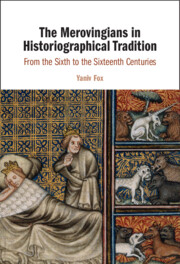Book contents
- The Merovingians in Historiographical Tradition
- The Merovingians in Historiographical Tradition
- Copyright page
- Contents
- Acknowledgements
- Abbreviations
- Introduction
- Part I Lions and Unicorns
- Chapter 1 Trojans, Sea-monsters, and Long-haired Kings: From Priam to Childeric
- Chapter 2 Capud victuriarum vestrarum Chlodovechus
- Part II Bears and Wolves
- Part III Dogs and Lesser Beasts
- Bibliography
- Index
Chapter 1 - Trojans, Sea-monsters, and Long-haired Kings: From Priam to Childeric
from Part I - Lions and Unicorns
Published online by Cambridge University Press: 02 November 2023
- The Merovingians in Historiographical Tradition
- The Merovingians in Historiographical Tradition
- Copyright page
- Contents
- Acknowledgements
- Abbreviations
- Introduction
- Part I Lions and Unicorns
- Chapter 1 Trojans, Sea-monsters, and Long-haired Kings: From Priam to Childeric
- Chapter 2 Capud victuriarum vestrarum Chlodovechus
- Part II Bears and Wolves
- Part III Dogs and Lesser Beasts
- Bibliography
- Index
Summary
The first chapter is dedicated to the origin stories that depicted the birth of the Franks and their leading family. Gregory of Tours was reluctant to discuss the topic, privileging other axes of identity. While he chose to downplay the importance of Frankish identity, his treatment of the arrival and establishment of the Franks betrays an understanding of distinct phases of Frankish history. The Trojan origin myth made its first appearance in the Chronicle of Fredegar. The second section is dedicated to the Trojan myth in Fredegar and the LHF and the possible reasons for its inclusion and for the rejection of competing origin myths. The third section discusses the Trojan comment in Paul the Deacon’s Gesta episcoporum Mettensium, which offered an idealized ancestry for Charlemagne and a curious reworking of Merovingian history. In the final section, the discussion will turn to the Trojan story found in the thirteenth-century Roman des rois. The process whereby the story was made to conform to contemporary royal and Dionysian ideologies will be presented, alongside a discussion of Primat’s usage of Childeric to explore Capetians' relations with their aristocracy.
Keywords
- Type
- Chapter
- Information
- The Merovingians in Historiographical TraditionFrom the Sixth to the Sixteenth Centuries, pp. 29 - 83Publisher: Cambridge University PressPrint publication year: 2023



